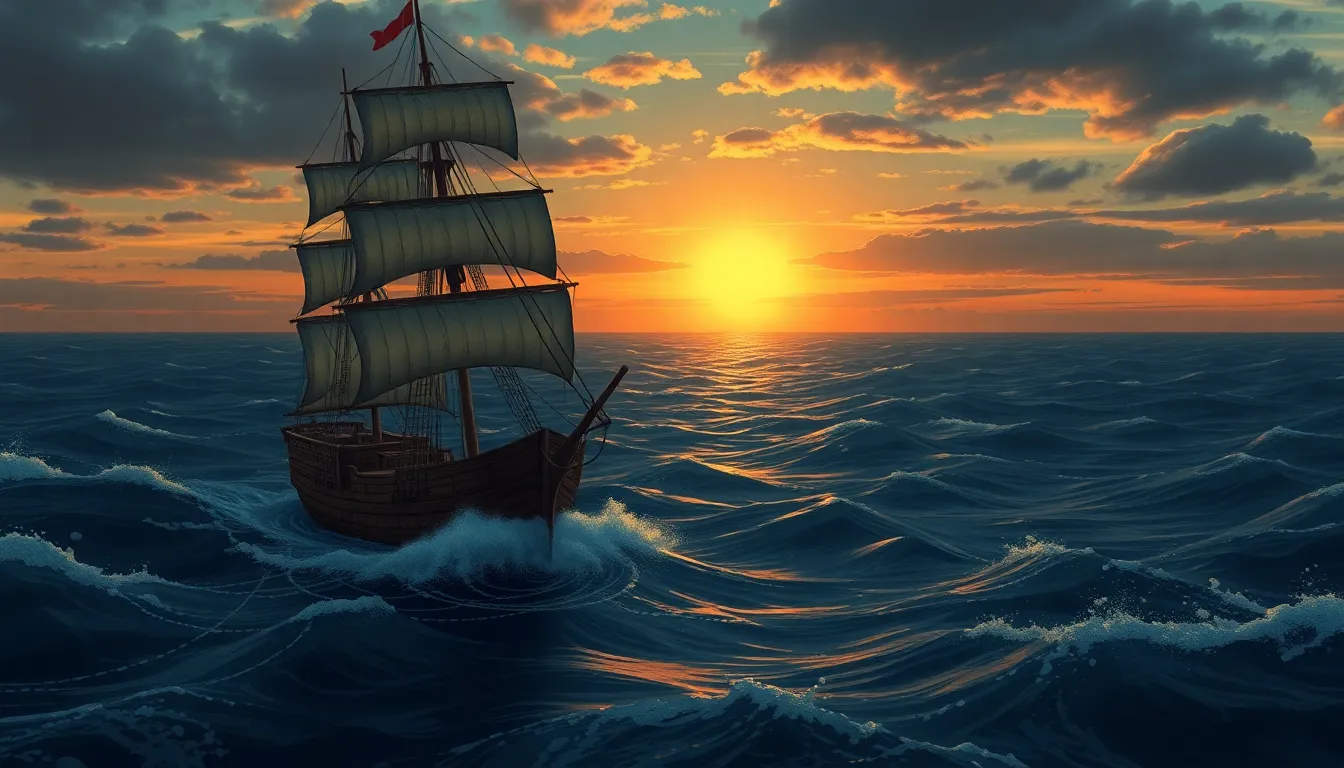Table of Contents
ToggleAhoy, adventure seekers! Imagine the wind in your hair and the salty sea spray on your face as you set sail on a journey across the open waters. Sea voyages have long captivated the hearts of explorers and dreamers alike, offering a unique blend of thrill and tranquility. Whether it’s the call of distant shores or the promise of hidden treasures, there’s something irresistible about the open ocean.
Overview of Sea Voyages
Sea voyages represent a journey across expansive waters, offering unique experiences. Travelers embark on these routes for both adventure and tranquility. The intersection of nature and exploration captivates those seeking to discover new horizons. Navigating the waves influences personal growth and provides a sense of freedom.
Historical sea voyages shaped global trade, culture, and exploration. Various civilizations relied on these journeys to expand their territories and exchange goods. Significant expeditions, like Magellan’s circumnavigation or Columbus’s discovery, highlight humanity’s drive to explore. Sea voyages continue to evolve with technology, integrating modern navigation systems and eco-friendly vessels.
Diversity in sea voyages attracts a broad audience. Recreational cruises cater to luxury seekers, while adventure sailing appeals to adrenaline enthusiasts. Expedition cruises focus on remote locations and wildlife interactions, such as Antarctica’s icy landscapes. Each type of voyage offers a distinct experience, allowing travelers to select journeys that match their interests.
Planning a sea voyage involves considering seasonal weather patterns and destination characteristics. Ideal travel times vary; summer often suits Mediterranean exploration, while winter attracts travelers to tropical escapes. Researching destinations enhances the overall experience and ensures a memorable adventure.
Ultimately, the excitement of sea voyages remains timeless. They allow individuals to connect with nature and immerse themselves in diverse cultures. Exploring new ports and savoring unique cuisines enrich every traveler’s journey. From tranquil sunsets to exhilarating waves, the allure of the sea offers boundless opportunities for discovery.
Historical Significance

Sea voyages hold immense historical significance, profoundly influencing global culture, economy, and exploration. These maritime journeys shaped world events and connected distant civilizations.
Ancient Sea Voyages
Ancient sea voyages, carried out by civilizations such as the Phoenicians and Polynesians, laid the groundwork for maritime navigation. Phoenicians established trade routes across the Mediterranean, facilitating commerce and cultural exchange. Similarly, Polynesians navigated vast ocean distances using stars and currents, effectively colonizing remote islands like Hawaii and Easter Island. These early explorers contributed to humanity’s understanding of geography and trade.
Exploration During the Age of Discovery
The Age of Discovery marked a pivotal period for sea voyages, driven by exploration and expansion. From the late 15th to the 17th century, explorers such as Christopher Columbus and Vasco da Gama embarked on transformative expeditions. Columbus’s 1492 voyage led to European awareness of the Americas, while da Gama’s route to India opened sea trade between Europe and Asia. These expeditions not only expanded geographical knowledge but also facilitated the exchange of goods, ideas, and cultures, forever altering global dynamics.
Types of Sea Voyages
Various types of sea voyages cater to different interests and objectives. Each journey offers a unique perspective on the vastness of the ocean.
Recreational Sailing
Recreational sailing appeals to those seeking leisure and adventure. People enjoy chartering boats for vacations or participating in regattas. Sailboats and yachts provide an opportunity to explore coastlines, harbor towns, and picturesque islands. Many individuals appreciate the sense of freedom that comes with shifting winds and open waters. Environmental awareness often plays a role, as sailing encourages respect for marine ecosystems. Recreational voyages foster camaraderie among sailors while promoting physical activity and relaxation.
Commercial Shipping
Commercial shipping represents a vital component of the global economy. Cargo ships transport goods across oceans, connecting markets and facilitating trade. They carry everything from raw materials to manufactured products. Major shipping routes, like the Trans-Pacific and Transatlantic, feature heavily trafficked lanes. The industry relies on advanced logistics to optimize shipping efficiency and minimize costs. Port facilities serve as crucial hubs for unloading cargo and distributing goods. Personnel often undergo specialized training to ensure safety and regulatory compliance.
Scientific Research Expeditions
Scientific research expeditions drive advancements in oceanography and marine biology. Researchers utilize vessels to study marine ecosystems, climate change effects, and deep-sea exploration. Expeditions often involve collaborations among universities, government agencies, and nonprofit organizations. Data collection methods include sonar, video footage, and water sampling. These voyages yield valuable insights that inform conservation efforts and sustainable practices. Scientists frequently publish their findings to share knowledge and promote awareness of ocean health. Efforts to protect marine environments gain traction through research-backed initiatives.
Challenges of Sea Voyages
Sea voyages face several challenges, particularly in relation to weather and navigation. These factors significantly impact journey safety and success.
Weather Conditions
Weather conditions can change rapidly at sea. Storms, high winds, and rough seas pose threats to navigation and vessel integrity. Seasonal variations affect voyage planning too. For instance, hurricane seasons can hinder passage through certain regions, leading to dangerous situations. Mariners often rely on advanced meteorological tools and satellite technology to monitor weather patterns. Such tools help them make informed decisions and avoid treacherous areas.
Navigational Difficulties
Navigational difficulties arise from various sources. Complex ocean currents and hidden underwater hazards complicate route planning. Additionally, the sheer size of oceans makes pinpointing locations challenging, especially without precise navigational instruments. Historical records reveal that even experienced sailors faced obstacles due to inaccurate maps and lack of technology. Today, modern vessels now utilize GPS and electronic charts to enhance navigational accuracy. Despite these advancements, human error remains a factor that can lead to navigational mishaps.
The Future of Sea Voyages
Sea voyages face a transformative future shaped by innovations and environmental priorities.
Technological Advancements
Innovative technologies are revolutionizing sea travel. Automation and artificial intelligence enhance navigation safety and efficiency. Integrated systems streamline communication between vessels and port authorities, reducing delays. Advanced materials improve vessel performance and fuel efficiency, leading to lower operational costs. Drone technology assists in monitoring ocean conditions, ensuring safer routes. Autonomous ships may redefine commercial shipping, minimizing human error. Virtual reality experiences onboard allow passengers to explore destinations before arrival. Enhanced tracking systems provide real-time data on weather and marine life, enriching adventure sailing experiences. Greener propulsion systems, like hydrogen fuel cells, promise to reduce emissions and environmental impact.
Environmental Considerations
Environmental sustainability has become a crucial focus in sea voyages. Climate change affects maritime routes and necessitates adaptive strategies. Emphasis on reducing plastic waste promotes eco-friendly practices among cruise lines and shipping companies. Conservation programs protect marine biodiversity, ensuring the oceans remain healthy for future generations. Efficient waste management systems minimize pollution from vessels. Awareness of coral reef ecosystems leads to responsible tourism that benefits local communities. Regulations encourage lower emissions and cleaner technologies across the shipping industry. Collaborative efforts among nations aim to protect marine environments from overfishing and habitat destruction. Prioritizing these considerations shapes the future of sea voyages toward more sustainable adventures.
Sea voyages continue to inspire and captivate adventurers around the globe. They offer a unique blend of thrill and serenity that few experiences can match. As technology advances and environmental concerns shape the industry, the allure of the open sea remains strong.
Whether it’s the thrill of discovering uncharted territories or the joy of connecting with diverse cultures, these journeys foster personal growth and a deeper appreciation for the world’s oceans. With each voyage, individuals not only explore new horizons but also contribute to the ongoing legacy of maritime exploration and sustainability. The call of the sea is timeless, inviting everyone to embark on their own adventure.





